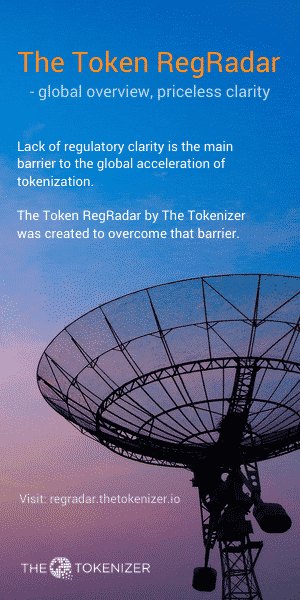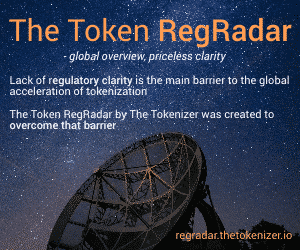A sneak peek at our upcoming regulatory reports
Regulatory overview across jurisdictions is crucial for accelerating our new tokenisation industry. That’s why The Tokenizer has launched The Token RegRadar and The RegCheck Service Suite, and it’s also why we are now preparing to publish the two new reports, Regulation at a Glance – Europe and Regulation at a Glance – Asia.
These two comprehensive reports provide an overview of the regulatory status of security tokens in no less than 26 European countries and 29 Asian countries. Below is a sneak peek into the Regulation at a Glance – Asia report, with a chapter on Japan.
Japan
Japan has gained global recognition as a technological innovator, especially in the area of digital assets. As early as April 2017, Japan legalized Bitcoin and other digital assets, treating them as property. Further legislative refinements were implemented in May 2020 to clarify regulatory frameworks applying to digital assets.
The Financial Services Agency (“FSA”) is the primary agency responsible for governing cryptocurrencies and related digital assets in Japan. Additionally, self-regulatory organizations like the Japan Security Token Offering Association (“JSTOA”) play a role in setting rules and guidelines for security tokens.
Japan, like many other jurisdictions in the area, takes a technology-neutral approach, classifying tokens based upon the token’s functions and uses. According to the Payment Services Act (“PSA”), specifically Article 2-5, defines two types of cryptoassets:
- Type 1: These digital assets are similar to digital money. They can be
- used to buy goods or services from anyone;
- bought or sold from anyone, as long as it is recorded electronically (but it cannot be regular money like Japanese Yen or USD);
- be sent or received using computers or other electronic systems.
- Type 2: These digital assets are similar to Type 1, the main difference being that they are exchangeable with Type 1 cryptoassets.
In essence, any digital asset used for payments and not tied to traditional currencies like the Japanese Yen is considered a cryptoasset under the PSA.
Japan’s Financial Instruments and Exchange Act (“FIEA”) regulates how financial products like stocks and bonds are issued and traded. Recent updates to the FIEA now include cryptoassets in the definition of “financial instruments.” The Act distinguishes between two types of securities:
- Paragraph 1 Securities include common financial products like stock, bonds, and investment fund units. These types of securities are highly regulated in large part due to their high liquidity and accessibility to the public.
- Paragraph 2 Securities are less common types of financial assets and are generally not as easy to trade as Paragraph 1 Securities. Given that these assets are typically less liquid than Paragraph 1 Securities, they are subject to fewer regulations. Some examples of Paragraph 2 Securities include
- trust beneficiary interests;
- limited partnerships; and
- limited liability companies.
The update to the FIEA also introduces a new category of securities, Electronically Recorded Transferable Rights (“ERTRs”), which are securities that are “represented by proprietary value transferable by means of an electronic data processing system (but limited only to proprietary values recorded in electronic devices or otherwise by electronic means).” Essentially, ERTRs are security tokens that confer certain rights to the token holder.
ERTRs are further categorized into:
- Tokenized Paragraph 1 Securities: Includes traditional financial assets like tokenized shares and bonds.
- ERTR Paragraph 2 Securities: These include assets such as tokenized fund units and trust beneficiary rights.
- Non-ERTR Tokenized Paragraph 2 Securities: These are similar to ERTRs in that they are less traditional financial assets like trust benefits or investment fund rights, but are different because there are additional limitations on how freely one can buy, sell, or transfer them online.
Turning to Security Token Offerings (STOs), the FIEA serves as the foundation for STOs in Japan, alongside self-regulatory organizations like the Japan Virtual Currency Exchange Association (“JVCEA”) and the Japan Security Token Offering Association (“JSTOA”). The amended FIEA states that security tokens are “interests in a collective investment scheme that are represented by tokens.” For there to be a presence of a “collective investment scheme,” the following must be present:
- An investment or contribution of money;
- The entity receiving the investment is operated using the contributed money; and
- The investor has the right to profits generated from the business or a distribution of property related to the business.
STOs meeting these criteria are subject to FIEA regulations, regardless of whether investments are made in digital currencies or traditional fiat.
Japan operates under a disclosure regime. Issuers looking to act as an intermediary or distributor of STOs to the general public must acquire a Type 1 License and adhere to strict mandates, including:
- Securities Registration Statement: An exhaustive document detailing the nature of the security, financial details, and risk factors.
- Ongoing Semi-Annual Reports: Continued reporting to maintain transparency and ensure investor protection.
If an issuer wants to conduct a self-offering, or in other words, directly issue, market, and sell their own security tokens, they must obtain a Type 2 License, with certain exemptions being available for issuers who deal exclusively with Qualified Institutional Investors (“QIIs”). The FIEA does however offer issuers a way to sidestep the disclosure requirements when conducting STOs through private placements.
The private placement exemption is less lenient for STOs categorized as Tokenized Paragraph 1 Securities than for other types of securities. Essentially, issuers can invoke this exemption only if they offer security tokens to QIIs or to fewer than 50 non-QIIs. Importantly, these limitations apply to the solicitation state, not just the final sale. Moreover, this exemption necessitates the inclusion of “resale restrictions” in the tokens’ smart contracts, limiting the tokens’ transferability.
Under Japan’s regulatory framework, the PSA regulates digital offerings involving cryptoassets, while the FIEA oversees STOs. Given that ICO tokens are not explicitly listed as securities, the determination of whether a particular ICO is subject to PSA or FIEA regulations is determined on a case-by-case basis. For a token to qualify as a cryptoasset under the PSA, it must:
- Not be pegged to a fiat currency;
- Be transferable electronically between users; and
- Be usable for purchasing goods or services.
Tokens that can be categorized as “other rights type” or “no rights type,” meaning the issuer of the tokens has either obligations other than the distribution of future profits and the like, or no obligations whatsoever. These types of tokens do not satisfy the third prong necessary to establish the presence of a collective investment scheme, and are therefore not subject to FIEA regulation, but will be governed by the PSA if considered cryptoassets, if the tokens in the offering satisfy the criteria set out above.
If the tokens being issued are deemed cryptoassets, entities conducting certain activities in Japan must register as a “cryptoasset exchange business” according to Article 63-2 of the PSA. Specifically, entities conducting the following activities as a business in Japan are subject to this registration:
- Buying and selling of a cryptoasset or exchanging with another cryptoasset;
- Performing intermediary or brokerage services for the buying, selling, or exchanging of cryptoassets;
- Managing user’s money in relation to the buying, selling, or exchanging of cryptoassets; and
- Managing cryptoassets on behalf of another person.
For token issuers, it is important to recognize that the issuance of cryptoassets itself is not regulated as a cryptoasset exchange business. However, if the offering involves the exchange of other cryptoassets for the cryptoassets being issued, the issuer must register as a cryptoasset exchange.
Importantly, tokens already being traded on exchanges, whether domestic or foreign, will likely fall under the PSA’s cryptoasset designation. Japanese regulators take this view due to the fact that the existence of exchange trading platforms indicate an intention for the tokens to function as freely transferable and tradeable cryptoassets.
Even tokens not yet actively traded may still qualify based on their structure. If the token issuer does not impose substantial restrictions on exchanging the tokens for fiat currencies or other cryptoassets, regulators will presume the intention is for the tokens to operate as freely tradeable cryptoassets subject to PSA rules.
Industry associations in Japan like the JVCEA have also published guidance for token issuers on registering ICOs per the PSA. Key requirements cover reviewing the token issuer’s business plan, disclosing token specifics and use of funds, properly managing ICO proceeds, implementing token security measures, and appropriate valuation methodologies.
Japan has demonstrated leadership in formulating balanced yet forward-thinking regulations for the token economy. It has achieved this through a combination of legislative refinement and collaboration with industry associations. As technology and markets continue to evolve, Japan’s regulatory adaptability will be pivotal for maintaining its position as a global leader in the digital asset landscape.
We are approaching lawyers and industry players in all relevant countries, offering them to participate as sponsors in the report. If you are interested, please contact our CEO, Michael Juul Rugaard, at [email protected] or by phone at +45 93 99 38 83.
Read other stories: JPMorgan Announces First Client Trade on Tokenized Network
Chintai and DNZ Venture Global Join Forces to Revolutionize Climate Action Through Tokenization
You Might also Like
























